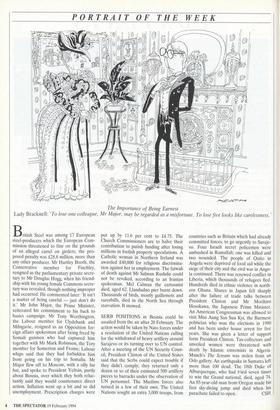PORTRAIT OF THE WEEK
The Importance of Being Earnest Lady Bracknell: 'To lose one colleague, Mr Major, may be regarded as a misfortune. To lose five looks like carelessness.'
British Steel was among 17 European steel-producers which the European Com- mission threatened to fine on the grounds of an alleged cartel on girders; the pro- posed penalty was £28.8 million, more than any other producer. Mr Hartley Booth, the Conservative member for Finchley, resigned as the parliamentary private secre- tary to Mr Douglas Hogg, when his friend- ship with his young female Commons secre- tary was revealed, though nothing improper had occurred. He commented later: 'It isn't a matter of being careful — just don't do it.' Mr John Major, the Prime Minister, reiterated his commitment to his back to basics campaign. Mr Tony Worthington, the Labour member for Clydebank and Milngavie, resigned as an Opposition for- eign affairs spokesman after being freed by Somali gunmen who had captured him together with Mr Mark Robinson, the Tory member for Somerton and Frome; Labour whips said that they had forbidden him from going on his trip to Somalia. Mr Major flew off to Moscow, with a silly fur hat, and spoke to President Yeltsin, partly about Bosnia, over which they both reluc- tantly said they would countenance direct action. Inflation went up a bit and so did unemployment. Prescription charges were
put up by 11.6 per cent to £4.75. The Church Commissioners are to halve their contribution to parish funding after losing millions in foolish property speculations. A Catholic woman in Northern Ireland was awarded £40,000 for religious discrimina- tion against her in employment. The fatwah of death against Mr Salman Rushdie could not be revoked, according to an Iranian spokesman. Mel Calman the cartoonist died, aged 62. Llandudno pier burnt down. Thousands of birds, mostly guillemots and razorbills, died in the North Sea through starvation. It snowed.
SERB POSITIONS in Bosnia could be assailed from the air after 20 February. The action would be taken by Nato forces under a resolution of the United Nations calling for the withdrawal of heavy artillery around Sarajevo or its turning over to UN control. After a meeting of the UN Security Coun- cil, President Clinton of the United States said that the Serbs could expect trouble if they didn't comply; they returned only a dozen or so of their estimated 500 artillery pieces to barracks under the observation of UN personnel. The Muslims forces also turned in a few of their own. The United Nations sought an extra 3,000 troops, from
countries such as Britain which had already committed forces, to go urgently to Saraje- vo. Four Israeli secret policemen were ambushed in Ramallah; one was killed and two wounded. The people of Quito in Angola were deprived of food aid while the siege of their city and the civil war in Ango- la continued. There was renewed conflict in Liberia, which thousands of refugees fled. Hundreds died in ethnic violence in north- ern Ghana. Shares in Japan fell sharply after the failure of trade talks between President Clinton and Mr Morihiro Hosokawa, the Japanese Prime Minister. An American Congressman was allowed to visit Miss Aung San Suu Kyi, the Burmese politician who won the elections in 1990 and has been under house arrest for five years. She was given a letter of support form President Clinton. Tax-collectors and unveiled women were threatened with death by Islamic extremists in Algeria. Munch's The Scream was stolen from an Oslo gallery. An earthquake in Sumatra left more than 100 dead. The 18th Duke of Alburquerque, who had tried seven times to win the Grand national, died, aged 74. An 85-year-old man from Oregon made his first sky-diving jump and died when his
parachute failed to open. CSH


















































 Previous page
Previous page